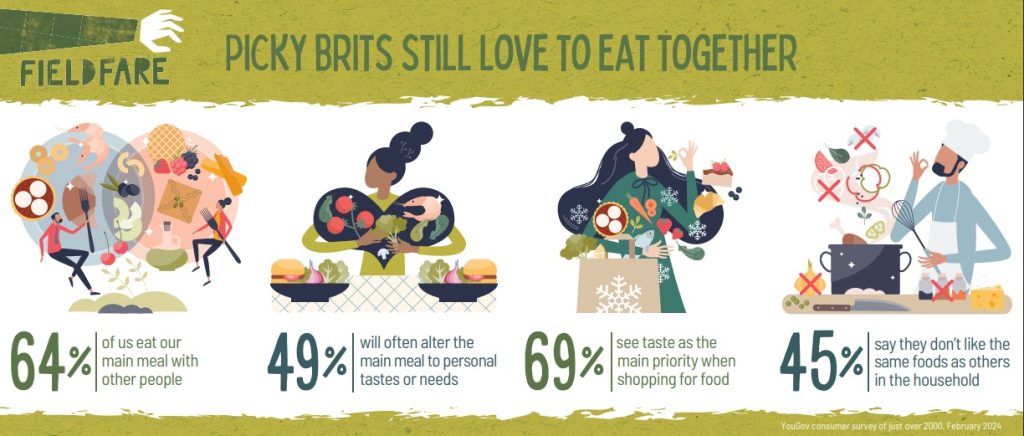A new survey by YouGov, commissioned by Fieldfare premium frozen foods, reveals that more than half of Brits now adjust their meals to suit personal tastes or dietary needs, potentially altering the traditional family dinner dynamic. The report highlights a shift towards individual preferences even during shared mealtimes, with significant implications for how families approach their evening meals.
The survey found that while nearly two-thirds (64%) of Britons still share their main meal with others, almost half (49%) make alterations to the meal to cater to personal preferences. Additionally, 17% of respondents reported eating entirely different dishes while dining together. This trend underscores a growing inclination towards personalised dining, driven by factors such as allergies, dietary restrictions, and individual tastes.
Among those who make meal adjustments, 13% cited dietary needs such as allergies or intolerances, while 15% noted specific diets like veganism or vegetarianism. However, a substantial 45% of respondents admitted that they simply don’t like the same foods as their family members. The survey identified generational differences in dining preferences, with Millennials (aged 35-44) and Gen Z (aged 18-24) being particularly influential. For Millennials, 55% prefer different dishes from their household, reflecting the lasting impact of the 90s culinary trend driven by celebrity chefs. Gen Z, on the other hand, values personal choice, with 37% of 18-24-year-olds stating their desire to choose their own meals rather than conform to a family menu.
The trend towards individual choice is mirrored in shopping habits, with taste being the primary factor for 69% of UK adults when selecting food. Quality is also a key consideration, with 51% seeking high-quality products. The survey also highlighted a growing preference for portioned or loose foods, with 38% valuing the ability to select the right amount of food. Supporting small or local businesses is important to 25% of respondents, while 32% prioritise choosing British brands.
Matt Whelan, MD of Fieldfare, commented on the findings: “It’s encouraging to see that, despite changing priorities and lifestyles, many people still manage to enjoy their main meal together. The increased availability of high-quality prepared and frozen foods has made it easier to accommodate diverse tastes and dietary needs.”
The report also noted that over a third (35%) of UK adults eat alone, with 56% of 18-24-year-olds reporting solitary meals. Additionally, 37% of couples dine together, reflecting the diversity in household structures and mealtime habits. The rise of single-person households, now comprising 32% of UK households, and the prevalence of dual-income families highlight the evolving nature of mealtimes.
Whelan emphasised the importance of adapting to these changes: “With a significant proportion of households now consisting of individuals or dual-income families, it’s crucial to rethink how we approach mealtimes. Our focus on choice and high-quality loose frozen foods aims to meet the needs of modern families and individuals alike.”
The survey findings suggest that while traditional family dinners may be evolving, the essence of shared mealtimes remains intact, albeit with a modern twist to accommodate individual preferences.

